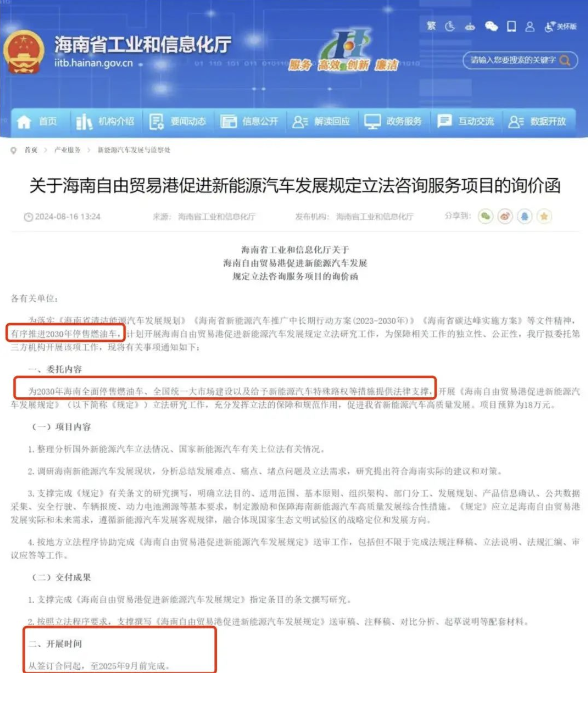Stop selling fuel vehicles! Hainan fired the first shot
![]() 09/02 2024
09/02 2024
![]() 439
439
Hainan will stop selling fuel vehicles in 2030
On August 20, according to the official website of the Hainan Provincial Department of Industry and Information Technology, Hainan has confirmed that fuel vehicles will be banned from sale in 2030.
The news mentioned that in order to implement the spirit of documents such as the "Development Plan for Clean Energy Vehicles in Hainan Province" and the "Medium- and Long-term Action Plan for the Promotion of New Energy Vehicles in Hainan Province (2023-2030)", Hainan plans to carry out the legislative research work on the regulations to promote the development of new energy vehicles in Hainan Free Trade Port to advance the ban on the sale of fuel vehicles in 2030 in an orderly manner.

The Hainan Provincial Department of Industry and Information Technology plans to entrust a third-party institution to carry out this work.
(Who is this third party? Government-enterprise cooperation or other forms? Anything is possible. If it is acquired by automakers, they will probably be able to dominate the new energy market in Hainan and show their prowess.)
The entrusted content includes providing legal support for measures such as Hainan's comprehensive ban on the sale of fuel vehicles in 2030, the construction of a unified national market, and granting special road rights to new energy vehicles.
Hainan's ban on the sale of fuel vehicles in 2030 is undoubtedly a significant piece of news, indicating that the penetration rate of new energy vehicles in Hainan will reach 100% after 2030, as there will be no fuel vehicles available for sale in Hainan.
China's Action to Ban the Sale of Fuel Vehicles
Under the pressure of global energy transformation and environmental protection, China, as a major automobile consumer and manufacturer, has taken a crucial step in banning the sale of fuel vehicles.
Domestic automakers are also responding positively: BYD has gradually phased out the production of fuel vehicles since 2023; Changan Automobile plans to stop selling fuel vehicles in 2025; Dongfeng Honda plans to completely stop producing fuel vehicles in 2027...
The new energy vehicle market is gradually thriving, with an increasingly complete industrial chain, and coupled with preferential policies introduced by the Chinese government, such as vehicle purchase subsidies, exemption from purchase taxes, and free parking, the market competitiveness of new energy vehicles has been enhanced... It is certain that new energy vehicles are the future trend.
According to the latest analysis report on the national passenger vehicle market in July 2024 released by the China Passenger Car Association, the new energy vehicle market achieved significant growth, with retail sales reaching 878,000 units in July, a year-on-year increase of 36.9% and a month-on-month increase of 2.8%. Notably, the retail penetration rate of domestic new energy vehicles exceeded 50% for the first time in July, reaching 51.1%.
With Hainan's decision, it is estimated that other regions across the country will follow suit, which will accelerate the penetration rate of new energy vehicles, officially ushering in the era of new energy vehicles.
Why Hainan?
The suitability of Hainan for the development of electric vehicles is evident for several reasons.
First, due to its consistently high temperatures throughout the year, battery life is not significantly reduced, unlike in northern regions.
Second, fuel prices in Hainan are high, making electric vehicles a cost-effective alternative.
Third, Hainan's highways are toll-free, with tolls incorporated into fuel prices, making electric vehicles a more economical choice for highway travel compared to other regions.
(After the new regulations are implemented, it is not fuel vehicle manufacturers that will be most affected, but rather oil companies such as China National Petroleum Corporation (CNPC) and China Petroleum & Chemical Corporation (Sinopec) that will likely experience the most direct and significant impact.)
Furthermore, Hainan's policy serves as a signal to attract new energy vehicle manufacturers, potentially driving the development of related industries in Hainan and improving the distribution of primary, secondary, and tertiary industries, thereby addressing the weakness of the secondary industry.
Others
If the sale of fuel vehicles is banned, there is no need for the National VII emission regulations.
China's decision to ban the sale of fuel vehicles in some provinces starting in 2030 conveys two messages:
First, the ban on fuel vehicles is implemented only in certain regions, not nationwide. Vast regions such as the northwest, cold northeastern regions, and the Inner Mongolia grassland are currently unable to widely adopt new energy vehicles due to local conditions.
Second, while the sale of fuel vehicles is banned, the use of oil is still permitted. Vehicles running on natural gas, methanol, hydrogen, biodiesel, and e-fuel are still allowed. Pure electric vehicles cannot cover all application scenarios, and traditional engine vehicles are still needed as a supplement. However, driven by environmental protection requirements, engine fuels need to be replaced with zero-carbon or carbon-neutral fuels.
In summary, while electric vehicles are indeed the trend, it is unrealistic to completely replace fuel vehicles in the short term. There is no need for undue alarm or exaggeration.







